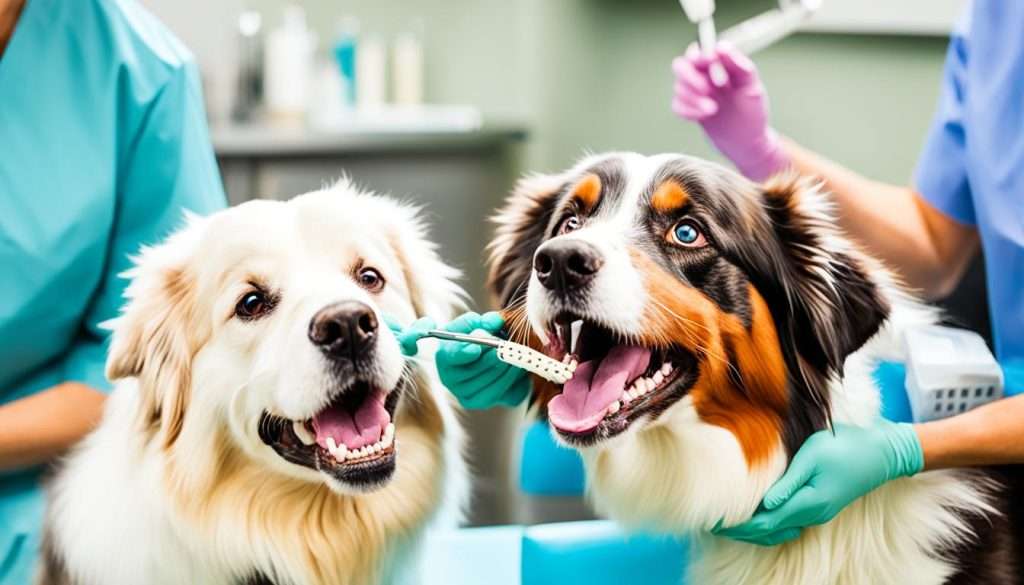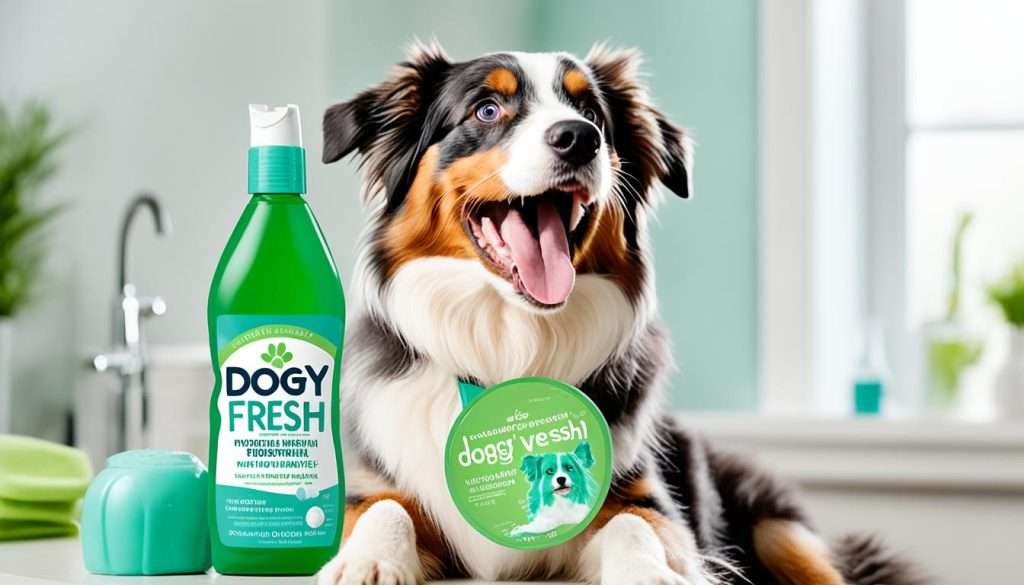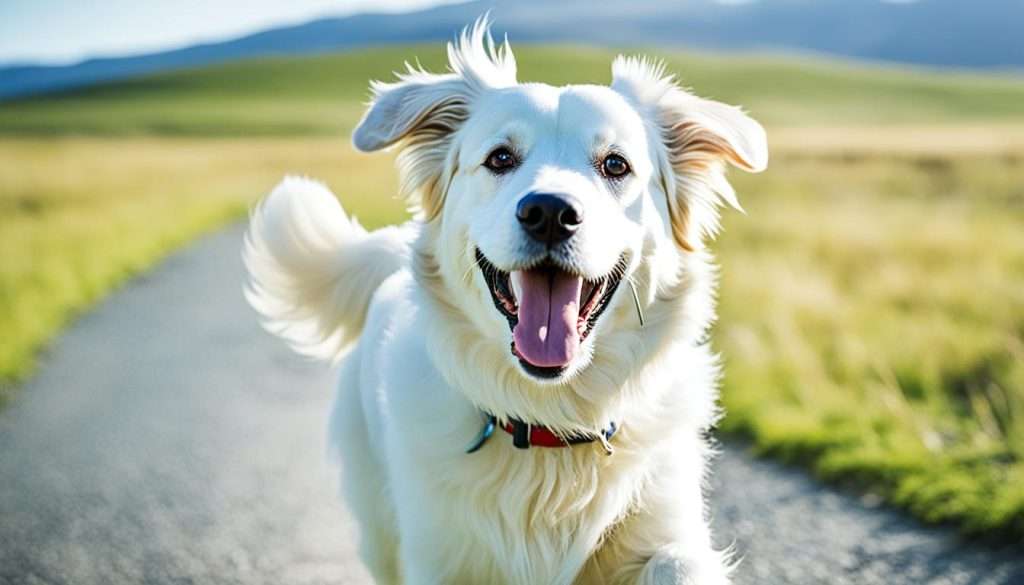Keeping your furry friend’s teeth and gums healthy is essential for their overall wellbeing. Just like humans, dogs can experience dental issues that can lead to discomfort and other health problems if left untreated. Fortunately, there are several ways you can promote good dental hygiene in your Australian pup.
Regular brushing, feeding them dental-friendly food, providing appropriate toys and treats, and scheduling regular vet check-ups are all crucial in maintaining your dog’s dental health. By following these simple tips, you can ensure your Aussie pup has a bright and healthy smile.
Key Takeaways:
- Regular brushing and dental care are vital for maintaining your dog’s dental health.
- A dental diet can benefit your dog’s oral health by promoting chewing and removing plaque.
- Choosing the right dental toys and treats can help dislodge plaque and promote saliva production.
- Adding mouthwash or oral health rinse to your dog’s routine can help prevent plaque build-up.
- Scheduling regular vet check-ups and professional cleanings can address dental issues before they become serious.
By prioritizing your dog’s dental care, you can ensure they have a healthy mouth and a wagging tail!
The Importance of Brushing Your Dog’s Teeth
Daily brushing gives your dog the best chance to have healthy teeth and gums. Introduce daily teeth cleaning to them when they are pups. If you have an older dog, with a bit of patience and lots of reward they’ll get used to it. Here’s how:
- Start slow: Begin by gently touching your dog’s mouth and teeth with your finger to get them used to the sensation.
- Choose the right toothbrush: Use a dog-specific toothbrush or a finger brush. These brushes are designed to be gentle on your dog’s teeth and gums.
- Use dog-friendly toothpaste: Never use human toothpaste as it can be harmful if swallowed. Look for toothpaste specially formulated for dogs.
- Make it a positive experience: Reward your dog with praise, treats, or playtime after each brushing session. This positive reinforcement will help them associate brushing with something enjoyable.
- Be patient: It may take some time for your dog to get comfortable with teeth brushing. Start with short sessions and gradually increase the duration as they become more accustomed to it.
Regular brushing is essential to prevent dental problems such as plaque buildup, tartar, and gum disease. By establishing a consistent brushing routine, you can ensure your dog maintains good dental health throughout their life.
Why Brushing Is Important
“Regular brushing helps remove plaque and food particles that can lead to dental disease in dogs. It reduces the risk of bad breath, tooth decay, and gum inflammation, keeping your dog’s mouth fresh and clean.”
The Benefits of a Dental Diet for Dogs
Your dog’s dental health is just as important as their overall well-being. One way to support their dental care is through a dental diet. By incorporating dental-specific food into their meals, you can provide your furry friend with several benefits that promote a healthy mouth.
A dental diet consists of dry kibble that is specially formulated to support your dog’s dental health. Unlike regular kibble, dental diet kibble is larger in size. This larger kibble encourages your dog to chew more, which is beneficial for their teeth and gums. As they gnaw on the bigger kibble, it helps to remove bits of plaque that may have formed on their teeth. The act of chewing harder also stimulates saliva production, which helps to protect the mouth from harmful bacteria and acids.

A dental diet is not only convenient but also an effective way to maintain your dog’s dental health. It complements regular brushing and professional dental cleanings, providing additional care for their teeth and gums.
When choosing a dental diet for your dog, look for high-quality options that are specifically designed to promote dental health. Consult with your veterinarian to determine the best dental diet for your canine companion based on their age, breed, and individual needs.
By incorporating a dental diet into your dog’s mealtime routine, you can take proactive steps towards ensuring their dental health. Remember, a healthy mouth leads to a happy and healthier dog!
Choosing the Right Dental Toys and Treats for Your Dog
When it comes to maintaining your dog’s dental health, the right toys and treats can make a significant difference. Not only do they provide your dog with mental stimulation and entertainment, but they also aid in removing plaque and promoting healthy gums. Here are some options to consider:
Dental Toys
Investing in a sturdy rubber toy for your dog’s collection is a great way to combat plaque build-up. These toys are designed to withstand vigorous chewing and can help scrape away plaque as your dog bites and gnaws on them. Look for durable options like Kong toys, which come in various shapes and sizes to suit your dog’s preferences. These toys not only provide an enjoyable chewing experience but also promote dental hygiene.
Dental Treats
In addition to dental toys, incorporating dental treats into your dog’s routine is another effective way to support their oral health. Dental treats are specifically designed to help dislodge plaque and promote the production of saliva, which helps protect your dog’s teeth and gums. Consider options like pig’s ears, rawhide bones, and dental chews, which have a texture that encourages chewing and effectively cleans your dog’s teeth.
Remember to choose treats that are appropriate for your dog’s size and breed, and opt for high-quality, veterinarian-recommended brands to ensure their safety and effectiveness.
“Dental toys and treats not only provide entertainment, but also play a crucial role in your dog’s dental care by helping to remove plaque and promote healthier teeth and gums.”
Add Mouthwash to Your Dog’s Oral Care Routine
No need to train your pooch to gargle, just add some oral health rinse to their water bowl or apply gel to their gums. This helps prevent plaque build-up and kills mouth bacteria.
Dogs can benefit from mouthwash just like humans do. Using a specially formulated dog mouthwash can help improve their dental care routine and maintain their oral health. Adding mouthwash to their daily routine provides an effective way to combat plaque and bacteria, ensuring fresher breath and healthier teeth and gums.
Mouthwash for dogs is designed to be easily incorporated into their regular oral care routine. It can be used by simply adding a few drops to their water bowl or applying gel directly to their gums. The mouthwash helps to kill bacteria that can lead to dental problems and freshens your dog’s breath. It is a convenient and efficient way to enhance your dog’s oral health without the need for extensive training or complex procedures.
When choosing a dog mouthwash, look for products specifically formulated for canines. These mouthwashes are safe for dogs to ingest and often contain ingredients that promote gum health and plaque prevention. Additionally, they may have a flavor that is appealing to dogs, making it easier to incorporate into their daily routine.
Key Benefits of Using Dog Mouthwash:
- Prevents plaque build-up
- Kills mouth bacteria
- Freshens breath
- Promotes gum health
By adding mouthwash to your dog’s oral care routine, you can take an extra step in ensuring their dental hygiene. Remember to consult with your veterinarian before introducing any new products or techniques into your dog’s dental care regimen to ensure it is suitable for their individual needs.

| Brand | Key Features | Price |
|---|---|---|
| Bonysol Dog Mouthwash | – Contains antibacterial agents – Freshens breath – Easy application |
$15.99 |
| PupFresh Oral Rinse | – Natural ingredients – Removes plaque – Promotes healthy gums |
$12.99 |
| DentaMax Tartar Control Mouthwash | – Tartar control formula – Reduces dental odor – Suitable for daily use |
$9.99 |
The Importance of Vet Check-ups for Dog Dental Health
Regular veterinary check-ups are crucial for maintaining your dog’s dental health and preventing dental diseases. During these check-ups, your vet can identify and address any oral issues before they worsen. If your dog exhibits bad breath and plaque buildup, it’s even more important to schedule a thorough examination.
During the check-up, your vet may recommend a scale and polish to remove tartar and plaque from your dog’s teeth. This professional cleaning procedure helps restore your dog’s dental health and prevents further complications.
In addition to the cleaning, your vet may also take x-rays to examine the roots of your dog’s teeth. This step is crucial in identifying any underlying dental issues, such as cavities, gum disease, or tooth root abscesses. Based on the x-ray findings, your vet may recommend root canals or seals to save your dog’s teeth and alleviate any potential pain or discomfort.
Regular vet check-ups play a vital role in ensuring your dog’s dental health and overall well-being. By addressing any dental issues proactively, you can prevent further complications and help your furry friend maintain a healthy and pain-free smile.
Why Dog Dental Care is Important for Overall Health
Good gut health is connected to good dental health in dogs. Around 80% of dogs over the age of 3 suffer from some form of dental disease. Dental disease (periodontal disease) is inflammation of a dog’s teeth and gums caused by the build-up of plaque.
Signs of Poor Dental Health in Dogs
Regularly monitoring your dog’s dental health is crucial in ensuring their overall well-being. By checking their gums and teeth every few weeks, you can spot potential issues early on and take appropriate action. Here are some signs that indicate poor dental health in dogs:
- Bad breath: If your dog has consistently unpleasant breath, it could be a sign of dental disease. Bad breath is often caused by the build-up of plaque and bacteria in the mouth.
- Swollen or red gums: Healthy gums should be pink, firm, and free of inflammation. If your dog’s gums appear swollen, tender, or have a reddish hue, it may indicate gum disease.
- Brown tartar build-up: Tartar is hardened plaque that forms on the teeth. If you notice brown or yellowish deposits on your dog’s teeth, it’s a clear indication of dental issues.
Addressing these signs of poor dental health promptly is essential to prevent further complications and discomfort for your furry friend. Regular dental care and professional check-ups can help maintain your dog’s oral health.

| Signs of Poor Dental Health in Dogs | Description |
|---|---|
| Bad breath | Consistently unpleasant breath caused by plaque build-up and bacteria. |
| Swollen or red gums | Healthy gums should be pink, firm, and free of inflammation. Swollen or red gums indicate gum disease. |
| Brown tartar build-up | Hardened plaque that forms on the teeth, causing brown or yellowish deposits. |
Feeding Your Aussie Pup for Dental Health
When it comes to maintaining your dog’s dental health, the right diet plays a crucial role. By choosing a natural, high-quality, Australian-made kibble specially formulated for dental hygiene, you can significantly benefit your pup’s oral health.
These specialized dental kibbles are larger in size, which encourages more chewing. As your dog bites into these kibbles, the act of chewing helps to remove plaque build-up from their teeth. This not only promotes dental hygiene but also stimulates saliva production, which acts as a natural defense mechanism to protect their mouth.
Providing your Aussie pup with a dental-focused diet is an excellent way to supplement their overall dental care routine. The added benefit of the kibble’s size and texture aids in reducing plaque and tartar accumulation.
| Benefits of Feeding Dental Kibble to Your Aussie Pup | How It Helps |
|---|---|
| Reduces plaque build-up | The larger kibble size promotes chewing, which removes plaque from the teeth. |
| Supports gum health | The act of chewing helps massage the gums, improving their overall health and reducing the risk of gum disease. |
| Helps prevent dental disease | Dental kibble aids in maintaining clean teeth and preventing dental issues such as periodontal disease. |
| Encourages good oral hygiene habits | The texture and taste of dental kibble make it enjoyable for your pup, promoting regular chewing and oral care habits. |
Remember, while dental kibble is beneficial for your dog’s oral health, it should not replace regular dental check-ups and teeth brushing. Combining a balanced diet, proper dental care, and regular veterinary examinations ensures your Aussie pup maintains optimal dental hygiene and overall well-being.
Conclusion
Taking care of your dog’s dental health is essential for their overall well-being. Regular brushing, a dental diet, appropriate dental toys and treats, mouthwash, and vet check-ups are all important steps in maintaining good dental hygiene for your pup. By following these tips, you can keep your Aussie pup’s teeth and gums in sparkling shape for a happier, healthier mate.
FAQ
Why is brushing your dog’s teeth important?
Brushing your dog’s teeth is important to maintain their dental health and prevent dental disease. Regular brushing helps to remove plaque and prevent the buildup of tartar, reducing the risk of gum disease and tooth decay.
How do I introduce my dog to teeth brushing?
It’s best to start brushing your dog’s teeth when they are puppies. However, if you have an older dog, you can still introduce them to teeth brushing with patience and rewards. Start by using a soft toothbrush or finger brush and dog-friendly toothpaste. Gradually build up the brushing time and reward your dog after each session.
How does a dental diet benefit my dog’s oral health?
A dental diet with larger kibbles encourages more chewing, which helps to remove plaque from your dog’s teeth. By chewing on the larger kibbles, bits of plaque are rubbed off, reducing the risk of plaque buildup and promoting healthier teeth and gums.
What dental toys and treats are suitable for my dog?
Sturdy rubber toys are great for knocking plaque off your dog’s teeth. Additionally, dental treats such as pig’s ears, rawhide bones, and dental chews can help to dislodge plaque and spread protective saliva, promoting better dental health.
Can I use mouthwash for my dog’s oral care?
Yes, you can add oral health rinse to your dog’s water bowl or apply dental gel to their gums to help prevent plaque buildup and kill mouth bacteria. However, it’s important to use products specifically formulated for dogs and consult with your veterinarian before introducing any new oral care routine.
Why are vet check-ups important for my dog’s dental health?
Regular vet check-ups are important to assess your dog’s dental health and catch any potential issues before they worsen. Your veterinarian can perform a thorough examination, including dental X-rays, and recommend appropriate treatments such as a scale and polish to remove plaque and tartar.
How does dog dental care impact overall health?
Dog dental care is essential for overall health as dental disease can lead to more serious health issues. Research has shown that maintaining good dental hygiene in dogs can help prevent infections, reduce the risk of heart disease, and improve overall well-being.
What are the signs of poor dental health in dogs?
Signs of poor dental health in dogs include bad breath, swollen or red gums, brown tartar build-up on teeth, difficulty eating or chewing, and loose or missing teeth. Regularly checking your dog’s gums and teeth can help identify any potential dental issues.
How can I feed my dog for dental health?
Feeding your dog a natural, high-quality, Australian-made kibble specifically designed for dental hygiene can benefit their oral health. The larger kibbles encourage more chewing, helping to remove plaque and promote healthier teeth and gums.